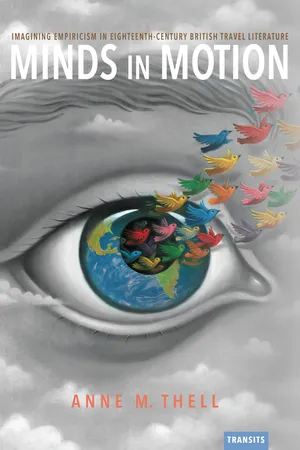
eBook - ePub
Minds in Motion
Imagining Empiricism in Eighteenth-Century British Travel Literature
- English
- ePUB (mobile friendly)
- Available on iOS & Android
eBook - ePub
About this book
The central claim of Minds in Motion is that British travel writing of the long eighteenth century functions as an epistemological playing field where authors test empiricist models of engagement with the world while simultaneously seeking out the role of the self and the imagination in producing knowledge. Whether exploring the relationship between the senses and the mind, the narrative viability of experimental detachment, or the literary dynamics of virtual witnessing, eighteenth-century travel authors persistently confront their positionality and raise difficult questions about the nature and value of first-hand experience. In one way or another, they also complicate empiricist ideals by exploring the limits of individual perception and the role of the imagination in generating and relating knowledge.
While the genre is often viewed as either numbingly documentary or non-literary and commercial, travel literature actually operates at the front line of the period's intellectual developments, illustrating both how individual writers grapple with philosophical ideals and how these ideals filter into the lives of ordinary people. Indeed, travel literature directly engages the scientific and philosophical concerns of the period, while it is also widely, avidly read; as such, it offers models for cognitive and rhetorical practices that are evaluated and either embraced or rejected by readers (in a process of identification not unlike that which occurs in early English fiction). Moreover, because eighteenth-century travel literature is so crucial to the development of so many fields—from botany to the novel—it illustrates vividly the divisive energies of discipline and genre formation while also archiving the shared aims and methods of what will become discrete fields of study. Travelogues as diverse as Margaret Cavendish's Blazing World (1666) and Samuel Johnson's Journey to the Western Islands of Scotland (1775) reveal the epistemological circuitry of the eighteenth century and historicize the absorption of the philosophical tendencies that have come to define modernity.
While the genre is often viewed as either numbingly documentary or non-literary and commercial, travel literature actually operates at the front line of the period's intellectual developments, illustrating both how individual writers grapple with philosophical ideals and how these ideals filter into the lives of ordinary people. Indeed, travel literature directly engages the scientific and philosophical concerns of the period, while it is also widely, avidly read; as such, it offers models for cognitive and rhetorical practices that are evaluated and either embraced or rejected by readers (in a process of identification not unlike that which occurs in early English fiction). Moreover, because eighteenth-century travel literature is so crucial to the development of so many fields—from botany to the novel—it illustrates vividly the divisive energies of discipline and genre formation while also archiving the shared aims and methods of what will become discrete fields of study. Travelogues as diverse as Margaret Cavendish's Blazing World (1666) and Samuel Johnson's Journey to the Western Islands of Scotland (1775) reveal the epistemological circuitry of the eighteenth century and historicize the absorption of the philosophical tendencies that have come to define modernity.
Frequently asked questions
Yes, you can cancel anytime from the Subscription tab in your account settings on the Perlego website. Your subscription will stay active until the end of your current billing period. Learn how to cancel your subscription.
At the moment all of our mobile-responsive ePub books are available to download via the app. Most of our PDFs are also available to download and we're working on making the final remaining ones downloadable now. Learn more here.
Perlego offers two plans: Essential and Complete
- Essential is ideal for learners and professionals who enjoy exploring a wide range of subjects. Access the Essential Library with 800,000+ trusted titles and best-sellers across business, personal growth, and the humanities. Includes unlimited reading time and Standard Read Aloud voice.
- Complete: Perfect for advanced learners and researchers needing full, unrestricted access. Unlock 1.4M+ books across hundreds of subjects, including academic and specialized titles. The Complete Plan also includes advanced features like Premium Read Aloud and Research Assistant.
We are an online textbook subscription service, where you can get access to an entire online library for less than the price of a single book per month. With over 1 million books across 1000+ topics, we’ve got you covered! Learn more here.
Look out for the read-aloud symbol on your next book to see if you can listen to it. The read-aloud tool reads text aloud for you, highlighting the text as it is being read. You can pause it, speed it up and slow it down. Learn more here.
Yes! You can use the Perlego app on both iOS or Android devices to read anytime, anywhere — even offline. Perfect for commutes or when you’re on the go.
Please note we cannot support devices running on iOS 13 and Android 7 or earlier. Learn more about using the app.
Please note we cannot support devices running on iOS 13 and Android 7 or earlier. Learn more about using the app.
Yes, you can access Minds in Motion by Anne M. Thell in PDF and/or ePUB format, as well as other popular books in Literature & English Literary Criticism. We have over one million books available in our catalogue for you to explore.
Information
Table of contents
- Contents
- Acknowledgments
- Abbreviations
- Introduction: Imagining Empiricism
- Chapter 1: Lady Phoenix: Motion, Imagination,and Cavendish’s Blazing World
- Chapter 2: Pirate Scientists: Narrative versus Natural History in the “New Voyages” of the 1690s
- Chapter 3: “A Prospect of the World on the other Side”: Defoe’s New Voyage and Virtual Travel Experience
- Chapter 4: Narrative Authority and Ideal Presence in John Hawkesworth’s Account of the Voyages
- Chapter 5 Johnson’s Journey and the Terror of Sight
- Epilogue: Imagining Perception
- Bibliography
- About the Author